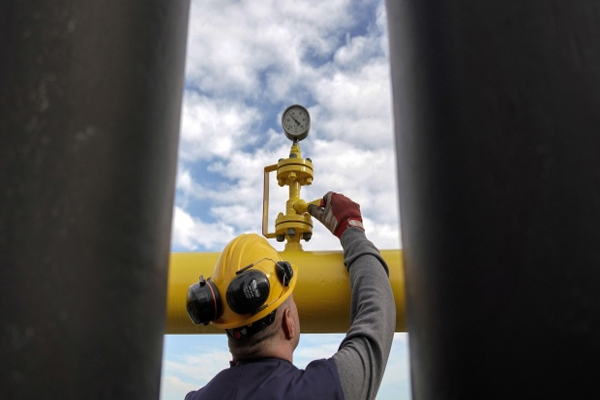
in Avala, near Belgrade, Serbia, on Wednesday, Jan. 5, 2022.(Oliver Bunic/Bloomberg)
Ewa Krukowska and John Ainger, Bloomberg News
BRUSSELS
EnergiesNet.com 03 24 2022
The European Union proposed tougher rules to quickly replenish the bloc’s depleted natural gas reserves and outlined short-term emergency options to shield the economy from the impact of an energy crisis aggravated by Russia’s invasion of Ukraine.
The EU’s executive arm on Wednesday adopted a draft regulation that requires countries to ensure that storages are filled up to 80% before next winter and 90% in the following years. In addition, it introduces a certification system to better control facilities owned by third-country operators such as Gazprom PJSC. The European Commission also called for joint purchases of gas by member states to help secure the best conditions.
The plan, which also involves an analysis of urgent tools to curb gas and power prices as well as a new state-aid framework to help comanies hit by the economic effects of the war waged by Russian President Vladimir Putin, will be discussed by EU leaders when they meet in Brussels on March 24-25. On the first day of the summit, they will be joined by President Joe Biden in a bid to showcase a common resolve against the Russian invasion.
“Global and European energy markets are going through turbulent times, particularly since the Russian invasion of Ukraine,” said EU Energy Commissioner Kadri Simson. “Europe needs to take swift action to ensure our energy supply for next winter, and to alleviate the pressure of high energy bills on our citizens and businesses”
The European push to bolster the continent’s resilience is part of its RePowerEU strategy to cut dependence on Russia, the region’s biggest energy supplier. The commission wants to reduce gas imports from the bloc’s eastern neighbor by almost two-thirds this year and phase out shipments of fossil fuels by 2027.
The flows can be replaced by growing renewables and greater energy efficiency and imports of pipeline gas and liquefied natural gas from other countries, according to the commission. To that end, the commission offered creating a task force on common gas purchases at EU level. By pooling demand, it would help ensure LNG, gas and hydrogen at affordable prices in partnerships with suppliers in the Mediterranean region, Africa, Middle East and U.S.
Meanwhile, gas storage operators that don’t receive certification — for fear that they are jeopardizing the region’s energy security — could be asked to sell their shares in such sites, an EU official told reporters in Brussels. Half of the missing gas in storage was because of the behavior at some facilities owned by third-country entities, like Gazprom, the official said.
“A joint negotiation team led by the commission would hold talks with gas suppliers, and would also prepare the ground for future energy partnerships with key suppliers, looking beyond LNG and gas,” it said in a statement. “It would be inspired by the experience from the Covid-19 pandemic, where EU wide action was crucial to guarantee sufficient supplies of vaccines for all.”
During President Biden’s visit to Brussels, he and European allies will announce “joint action on enhancing European energy security and reducing Europe’s dependence on Russian gas at long last,” his national security adviser, Jake Sullivan, said at a briefing Tuesday.
At the summit, EU heads of government will likely throw their weight behind the plan to work with the commission on joint purchases, according to a draft political statement seen by Bloomberg. They are also set to endorse the use of the state aid framework and an option to impose a temporary tax on windfall profits by some energy companies, while stopping short of backing intervention in the wholesale energy market to curb prices.
Such intervention could be carried out though financial compensation for power producers using fossil fuels for part of their high costs so that they reduce their offered price in the wholesale market, the Commission said. Another option could be directly capping the electricity price in the wholesale market by setting a reference benchmark and compensating the difference with the offered price.
“There is no single easy answer to tackle high electricity prices, given the diversity of situations among member states in terms of their energy mix, market design, and interconnection levels,” the commission said. “While many of the options above address the symptoms, it is important to tackle the root causes of the current high electricity prices, with collective European action on the gas market.”
bloomberg.com 03 23 2022







